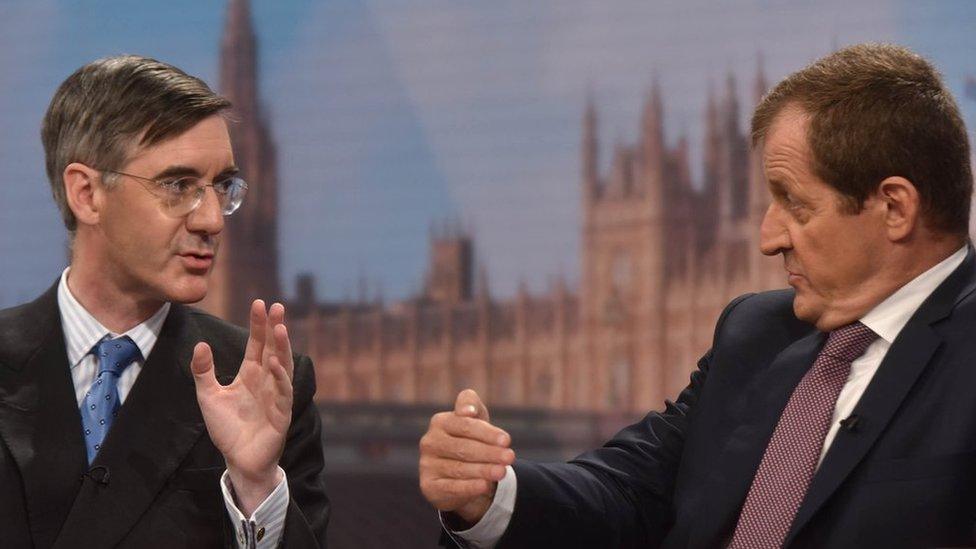Is Brexit costing £1m a day and other claims
- Published

Former Labour communications and strategy chief, Alastair Campbell, was involved in the Today Debate on Radio 4 on Tuesday 31 January about how Brexit is going with, among others, Jacob Rees-Mogg, the Conservative former minister for Brexit opportunities.
In an exchange with Mr Rees-Mogg about official trade figures, Mr Campbell said: "The ONS (Office for National Statistics) have also said that Brexit is costing us a million pounds a day."
Reality Check contacted Mr Campbell about this claim and he corrected himself, saying that it was actually £1m an hour (he also tweeted this correction)., external
He added that it was not the ONS that said it - the line was in a briefing from the European Movement, an organisation that supports the UK rejoining the European Union (EU).
The £1m an hour figure was quoted, external by its director of communications on Politics Live in September 2022.
Reality Check asked the European Movement where the figure came from and was pointed towards an interview with, external the head of consumer research at the delivery company ParcelHero.
The calculation used was to look at the UK's export of goods to the EU in 2021, which ParcelHero said was down £20bn compared with 2018.
After analysing this dataset,, external we make it a fall of £18.5bn, but it was certainly reported as £20bn, external at the time and these figures are revised regularly.
ParcelHero then took off the £11bn net contributions it said the UK wasn't making to the EU budget after Brexit, to give £9bn for the year, which is indeed about £1m an hour.
But this is not a good way to measure the impact of Brexit on the economy because:
it allocates the entire fall in UK exports in 2021 compared with 2018 to Brexit, when there were other things going on, notably the Covid pandemic
these figures are out of date - we already have trade figures for the first nine months of 2022, which show considerable increases
it is only looking at exports and not, for example, imports and investment
Comparing trade figures
The recovery in UK exports in 2022 was what Mr Rees-Mogg highlighted.
He compared figures for the third quarter (July to September) of 2022 with those for the same period of 2015, before the EU referendum.
"Our exports to the EU in that period rose from £56bn to £90bn, and with the rest of the world from £73bn to £128bn and these are the ONS figures, which I would encourage people to look up," Mr Rees-Mogg said.
You can find those figures for exports to the EU here,, external and for exports to the rest of the world here., external
By that measure, there has been a considerable recovery in UK exports since the pandemic.
But much of that may be because of rising inflation, so UK exporters are not exporting more, it is just that the prices have gone up.
If you look at the inflation-adjusted ONS figures for total exports, the increase between the third quarter of 2015 and the third quarter of 2022 is 15%.
This is considerably less than the 70% increases in total exports that Mr Rees-Mogg referred to. But the inflation-adjusted ONS figures in the chart below have still not recovered to pre-pandemic levels.

And again, just looking at what has happened to UK exports is not an ideal measure of the impact of Brexit on the economy.
What we are interested in is not how much better or worse the economy is doing than before the EU referendum - we need a measure of how much better or worse the UK is doing than it would have done if it had voted to stay in the EU.
That is not a straightforward thing to do. UK in a Changing Europe has tried to do it by comparing the UK with other advanced economies, and it found that UK trade had not recovered as well as others.
"It is difficult to explain this marked underperformance except by reference to the direct and indirect impacts of Brexit," it said., external
Watch: Ros Atkins on... Brexit and the economy
And there have been other attempts to measure the impact of Brexit on the UK economy.
For example, the independent Office for Budget Responsibility, which comes up with economic forecasts for the government, estimated the new trading relationship with the EU would reduce long-term UK productivity by 4% compared with remaining in the EU.
It also predicted that exports and imports would both be about 15% lower in the long run than if the UK had stayed in the EU.


